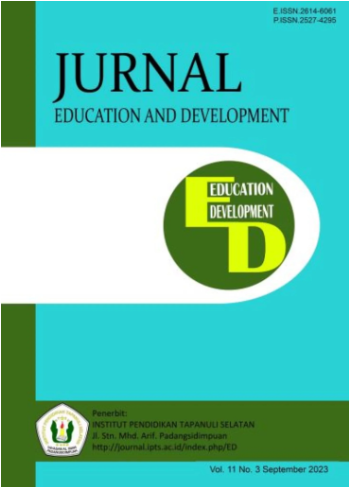STUDENTS PERCEPTION IN USING CHAT-GPT TECHNOLOGY TOWARD LEARNING ACTIVITIES
Main Article Content
Abstract
The aim of this study is to know the benefits and students' perceptions of using Chat-GPT Technology toward learning activities. It is to describe the students’ perception of using Chat-GPT technology toward learning activities in class with the lecturer. The data was collected through a questionnaire and interview. Furthermore, the subject in this research was students in the Language Education Study Program in Teacher Training and Education Faculty in Universitas Islamic of Kadiri, academic year 2023/2024. The respondents were 40 students of English language education FKIP UNISKA-Kediri. Collecting data from interviews and questionnaires served as the first step in the data analysis process. According to the research findings, students expressed satisfaction with Chat-GPT's speed and accuracy of responses, ease of use, benefits, and improvement of knowledge. They also expressed satisfaction with Chat-GPT's ability to increase efficiency and effectiveness of time and improve learning activities. A few students even felt inspired to write scientific papers using the ideas they received from Chat-GPT. On the other hand, students felt there were concerns about unfair selection and the risk of plagiarism that could undermine critical thinking skills. Given the positive perception given by students about the use of Chat-GPT in learning, regulations on using Chat-GPT should be given to teachers before allowing students to use Chat-GPT so that student controls and restrictions in using Chat-GPT are not excessive so that learning activities can run orderly, fairly and responsibly.
Article Details

This work is licensed under a Creative Commons Attribution-NonCommercial-ShareAlike 4.0 International License.
References
Baidoo-Anu,David, and Leticia Owusu Ansah. 2023. “Education in the Era of Generative Artificial Intelligence (AI): Understanding the Potential Benefits of Chat-GPT in Promoting Teaching and Learning.” Journal of AI 7(1):52–62. doi: 10.2139/ssrn.4337484.
Dehouche, N. (2021). Plagiarism in the age of massive Generative Pre-trained Transformers (GPT-3). Ethics in Science and Environmental Politics, 21, 17–23. https://doi.org/10.3354/esep00195
Essel, H. B., Vlachopoulos, D., Tachie-Menson, A., Johnson, E. E., & Baah, P. K. (2022). The impact of a virtual teaching assistant (chatbot) on students’ learning in Ghanaian higher education. International Journal of Educational Technology in Higher Education, 19(1), 1- 19. https://doi.org/10.1186/s41239-022-00362-6
Firat, M. (2023). How Chat-GPT Can Transform Autodidactic Experiences and Open Education? Use of Technology in ODL View project Distance Education and Digital divide View project. Department of Distance Education, Open Education Faculty, January, 1–5. https://doi.org/10.31219/osf.io/9ge8m
García-Peñalvo, Francisco José. 2023. “The Perception of Artificial Intelligence in Educational Contexts after the Launch of Chat-GPT: Disruption or Panic?” Education in the Knowledge Society (EKS). https://doi.org/10.14201/eks.31279
Gheytasi, M., Azizifar, A., & Gowhary, H. (2015). The Effect of Smartphones on the Reading Comprehension Proficiency of Iranian EFL Learners. Procedia - Social and Behavioral Sciences, 199, 225–230. https://doi.org/10.1016/J.SBSPRO.2015.07.510
Haleem, A., Javaid, M., & Singh, R. P. (2022). An era of Chat-GPT as a significant futuristic support tool: A study on features, abilities, and challenges. BenchCouncil Transactions on Benchmarks, Standards and Evaluations, 2(4), 1–8. https://doi.org/10.1016/j.tbench.2023.100089
Haque, M. U., Dharmadasa, I., Sworna, Z. T., Rajapakse, R. N., & Ahmad, H. (2022). “I think this is the most disruptive technology”: Exploring Sentiments of Chat-GPT Early Adopters using Twitter Data. Exploring Sentiments of Chat-GPT Early Adopters Using Twitter Data. ArXiv Preprint ArXiv:2212.05856, 1–12. http://arxiv.org/abs/2212.05856
Lund, B. D., & Wang, T. (2023). Chatting about Chat-GPT: how may AI and GPT impact academia and libraries? Library Hi Tech News, 40(3), 26–29. https://doi.org/10.1108/LHTN-01-2023-0009
Mairisiska, T., & Qadariah, N. (2023). Persepsi Mahasiswa Ftik Iain Kerinci Terhadap Mairisiska, T., & Qadariah, N. (2023). Persepsi Mahasiswa Ftik Iain Kerinci Terhadap Penggunaan Chat-GPT Untuk Mendukung Pembelajaran Di Era Digital. Jurnal Teknologi Pembelajaran Indonesia, 13, 1–10.
Martins, M. de L. (2015). How to Effectively Integrate Technology in the Foreign Language Classroom for Learning and Collaboration. Procedia - Social and Behavioral Sciences, 174, 77–84. https://doi.org/10.1016/J.SBSPRO.2015.01.629
Muhammad, J. M., Cecep, D., & Rahmat. (2023). Penggunaan Chat-GPT dalam pendidikan berdasarkan perspektif etika akademik. Jurnal Bhinneka Tunggal Ika, 10(01), 58–66. https://ejournal.unsri.ac.id/index.php/jbti/article/view/21090
Sallam, M. (2023). Chat-GPT Utility in Healthcare Education, Research, and Practice: Systematic Review on the Promising Perspectives and Valid Concerns. Healthcare, 11(6), 887. https://doi.org/10.3390/healthcare11060887
Sugiyono. (2019). Metode Penelitian Pendidikan Pendekatan Kuantitatif, Kualitatif, Dan R&D. Alfabeta.
Ramadhan, F. K., Faris, M. I., Wahyudi, I., & Sulaeman, M. K. (2023). Pemanfaatan Chat-GPT Dalam Dunia Pendidikan. Jurnal Ilmiah Flash, 9(1), 25-30. https://doi.org/10.32511/flash.v9i1.1069
Rizki, M. ., Wardana, M. D. K., & Hermawan, H. (2023). GPT AI Chat: Revolutionizing Education for Civil Engineering Student Performance. Academia Open, 8(1), 1–12. https://doi.org/10.1016/s1000-9361(22)00296-5
Shidiq, M. (2023). The Use of Artificial Intelligence-Based Chat-GPT and Its Challenges For The World of Education; From The Viewpoint of The Development of Creative Writing Skills. Proceeding of 1st International Conference on Education, Society and Humanity, 01(01), 353–357. https://ejournal.unuja.ac.id/index.php/icesh/article/view/5614/2065
Suharmawan, W. (2023). Pemanfaatan Chat-GPT Dalam Dunia Pendidikan. Education Journal : Journal Educational Research and Development, 7(2), 158–166. https://doi.org/10.31537/ej.v7i2.1248
Supriyadi, E. (2022). Eksplorasi Penggunaan Chat-GPT Dalam Penulisan Artikel Pendidikan Matematika. Papanda Journal of Mathematics and Sciences Research (PJMSR), 1, 54– 68. https://doi.org/https://doi.org/10.56916/pjmsr.v1i2.252
Wibowo, T. U. S. H., Akbar, F., Ilham, S. R., & Fauzan, M. S. (2023). Tantangan dan Peluang Penggunaan Aplikasi Chat-GPT Dalam Pelaksanaan Pembelajaran Sejarah Berbasis Dimensi 5.0. PETISI, 04(02), 69–76. https://doi.org/https://doi.org/10.36232/jurnalpetisi.v4i2.4226
Xames, Md Doulotuzzaman, and Jannatul Shefa. 2023. “Chat-GPT for Research and Publication: Opportunities and Challenges.” Journal of Applied Learning & Teaching 6(1). https://doi.org/10.37074/jalt.2023.6.1.20
Yunus, M., Si, F. M., & Nafiati, D. A. (2013). Pengaruh Pemberian Motivasi Belajar oleh Guru Terhadap Prestasi Belajar Siswa pada Mata Pelajaran IPS di SMP NU 01 Hasyim Asy’ari Tarub Tahun …. OSF. Io. https://osf.io/p7abu/download

